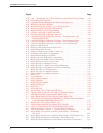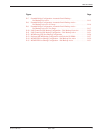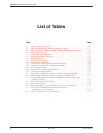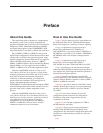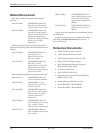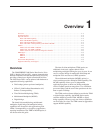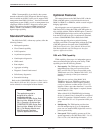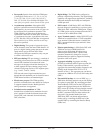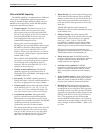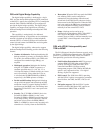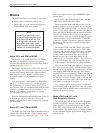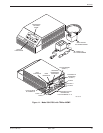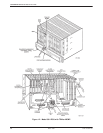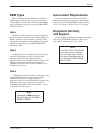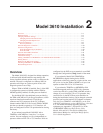
COMSPHERE 3600 Series Data Service Units
1-4 March 1999 3610-A2-GB41-60
DSU with MCMP Capability
The MCMP capability is an enhancement to TDM and
allows up to six independent application programs to
share one standard 56 kbps multipoint facility. Only an
MCMP can be configured to provide MCMP capability
and provides the following features:
• Channel capacity. The channel capacity is six
channels, which can be assigned to any of the
physical ports. One port is provided on the DSU,
and one (2-port version) or five EIA-232 ports are
provided on the MCMP circuit card. Up to six
virtual multipoint circuits can exist over one
standard DDS multipoint facility.
There are two versions of the Model 3610
MCMP/Flex: the 2-port MCMP/Flex and the 6-port
MCMP/Flex. With one of these features installed,
each port can be set as either EIA-232 or V.35
interface. When a port other than Port 1 is used for
V.35 operation, a cable adapter is required (feature
number 3000-F1-510).
When a Model 3610 MCMP/DSD (an MCMP that
can operate as a digital sharing device) is ordered,
Ports 2 through 6 are configured for EIA-232
operation. You can select either EIA-232 or V.35
operation for this port group.
• Number of addressable devices. The MCMP
capability supports up to 40 tributary DSUs or
20 tributary DSUs with DBMs, each equipped with
an MCMP circuit card.
• Line speeds. The MCMP capability operates at
56 kbps full-duplex. The total usable bandwidth for
the port is an aggregate bit rate of up to 48 kbps.
• Channel speeds. Speeds of the individual channels
can be arbitrarily set to 1.2, 2.4, 4.8, 7.2, 9.6, 12,
14.4, 16.8, 19.2, 38.4, or 48 kbps full-duplex. The
sum of the channel speeds cannot exceed 48 kbps.
• Asynchronous operation. Although the DSU
provides synchronous transmission through the
DDS network, any of the channels (ports) can be
configured for asynchronous operation. The MCMP
capability provides the asynchronous-to-
synchronous conversion on these channels.
The channel speed choices are the same as those for
synchronous operation. The word size can range
from 6 to 10 bits, and one or two stop bits can be
specified. Asynchronous data rates of 150, 300,
600, 1200, and 1800 bps are also supported.
• Digital sharing. Up to three digital-sharing groups
can be formed at each tributary site by assigning
channels to more than one port. Since all ports in a
digital-sharing group share the same channel, all
ports operate at the same speed and all receive the
same data.
With MCMP capability, digital sharing and
multiplexing can be in effect simultaneously at any
of the tributary sites.
• FEP port sharing. Up to three separate FEP
port-sharing groups can be selected when using the
MCMP option, each consisting of two adjacent
ports (e.g., 1 and 2, 3 and 4, 5 and 6). FEP
port-sharing is a method of connecting an FEP to
multiple control DSUs/modems to broadcast the
same message over the network and the shared port.
FEP data and control signal transmissions pass
through the odd-numbered port for broadcast onto a
TDM channel and the even-numbered port.
• Elastic store per port. The MCMP capability
provides a transmit elastic store buffer on each port
to support extended circuits. Both digital and
analog extensions are supported.
• Switched-carrier emulation. In MCMP
transmission, switched-carrier emulation for each
channel is standard inbound (toward the control
DSU) and optional outbound (from the tributary
DSU).
• Async Terminal control. A Model 3610 DSU with
MCMP can be controlled from an async terminal.
When this feature is enabled, the DSU is operated
from the async terminal’s menu and keyboard.
• Dial backup. Dial backup using the aggregate
switching and extended bridge capabilities allow
for multipoint service restoration. When aggregate
switching is enabled, the DSU provides an internal
aggregate data stream that includes diagnostics and
framing on the EIA-232-D and V.35 interfaces of
Port 1. The aggregate port (the DTE port not
selected under the General option set) can then be
connected to an extended bridge so the data can be
sent to multiple Switched 56 DBMs – either 2-wire
or 4-wire.



